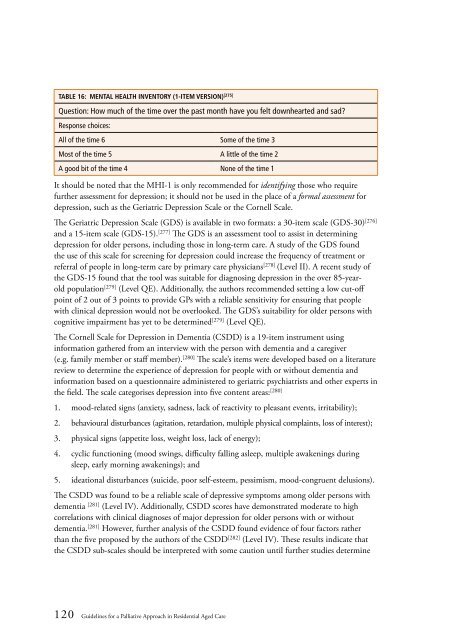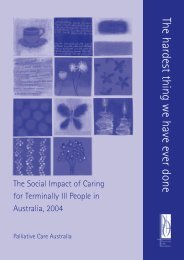Guidelines for a Palliative Approach in Residential Aged Care
Guidelines for a Palliative Approach in Residential Aged Care
Guidelines for a Palliative Approach in Residential Aged Care
Create successful ePaper yourself
Turn your PDF publications into a flip-book with our unique Google optimized e-Paper software.
Table 16: Mental Health Inventory (1-item version) [275]<br />
Question: How much of the time over the past month have you felt downhearted and sad?<br />
Response choices:<br />
All of the time 6 Some of the time 3<br />
Most of the time 5 A little of the time 2<br />
A good bit of the time 4 None of the time 1<br />
It should be noted that the MHI-1 is only recommended <strong>for</strong> identify<strong>in</strong>g those who require<br />
further assessment <strong>for</strong> depression; it should not be used <strong>in</strong> the place of a <strong>for</strong>mal assessment <strong>for</strong><br />
depression, such as the Geriatric Depression Scale or the Cornell Scale.<br />
The Geriatric Depression Scale (GDS) is available <strong>in</strong> two <strong>for</strong>mats: a 30-item scale (GDS-30) [276]<br />
and a 15-item scale (GDS-15). [277] The GDS is an assessment tool to assist <strong>in</strong> determ<strong>in</strong><strong>in</strong>g<br />
depression <strong>for</strong> older persons, <strong>in</strong>clud<strong>in</strong>g those <strong>in</strong> long-term care. A study of the GDS found<br />
the use of this scale <strong>for</strong> screen<strong>in</strong>g <strong>for</strong> depression could <strong>in</strong>crease the frequency of treatment or<br />
referral of people <strong>in</strong> long-term care by primary care physicians [278] (Level II). A recent study of<br />
the GDS-15 found that the tool was suitable <strong>for</strong> diagnos<strong>in</strong>g depression <strong>in</strong> the over 85-yearold<br />
population [279] (Level QE). Additionally, the authors recommended sett<strong>in</strong>g a low cut-off<br />
po<strong>in</strong>t of 2 out of 3 po<strong>in</strong>ts to provide GPs with a reliable sensitivity <strong>for</strong> ensur<strong>in</strong>g that people<br />
with cl<strong>in</strong>ical depression would not be overlooked. The GDS’s suitability <strong>for</strong> older persons with<br />
cognitive impairment has yet to be determ<strong>in</strong>ed [279] (Level QE).<br />
The Cornell Scale <strong>for</strong> Depression <strong>in</strong> Dementia (CSDD) is a 19-item <strong>in</strong>strument us<strong>in</strong>g<br />
<strong>in</strong><strong>for</strong>mation gathered from an <strong>in</strong>terview with the person with dementia and a caregiver<br />
(e.g. family member or staff member). [280] The scale’s items were developed based on a literature<br />
review to determ<strong>in</strong>e the experience of depression <strong>for</strong> people with or without dementia and<br />
<strong>in</strong><strong>for</strong>mation based on a questionnaire adm<strong>in</strong>istered to geriatric psychiatrists and other experts <strong>in</strong><br />
the field. The scale categorises depression <strong>in</strong>to five content areas: [280]<br />
1. mood-related signs (anxiety, sadness, lack of reactivity to pleasant events, irritability);<br />
2. behavioural disturbances (agitation, retardation, multiple physical compla<strong>in</strong>ts, loss of <strong>in</strong>terest);<br />
3. physical signs (appetite loss, weight loss, lack of energy);<br />
4. cyclic function<strong>in</strong>g (mood sw<strong>in</strong>gs, difficulty fall<strong>in</strong>g asleep, multiple awaken<strong>in</strong>gs dur<strong>in</strong>g<br />
sleep, early morn<strong>in</strong>g awaken<strong>in</strong>gs); and<br />
5. ideational disturbances (suicide, poor self-esteem, pessimism, mood-congruent delusions).<br />
The CSDD was found to be a reliable scale of depressive symptoms among older persons with<br />
dementia [281] (Level IV). Additionally, CSDD scores have demonstrated moderate to high<br />
correlations with cl<strong>in</strong>ical diagnoses of major depression <strong>for</strong> older persons with or without<br />
dementia. [281] However, further analysis of the CSDD found evidence of four factors rather<br />
than the five proposed by the authors of the CSDD [282] (Level IV). These results <strong>in</strong>dicate that<br />
the CSDD sub-scales should be <strong>in</strong>terpreted with some caution until further studies determ<strong>in</strong>e<br />
120 <strong>Guidel<strong>in</strong>es</strong> <strong>for</strong> a <strong>Palliative</strong> <strong>Approach</strong> <strong>in</strong> <strong>Residential</strong> <strong>Aged</strong> <strong>Care</strong>
















